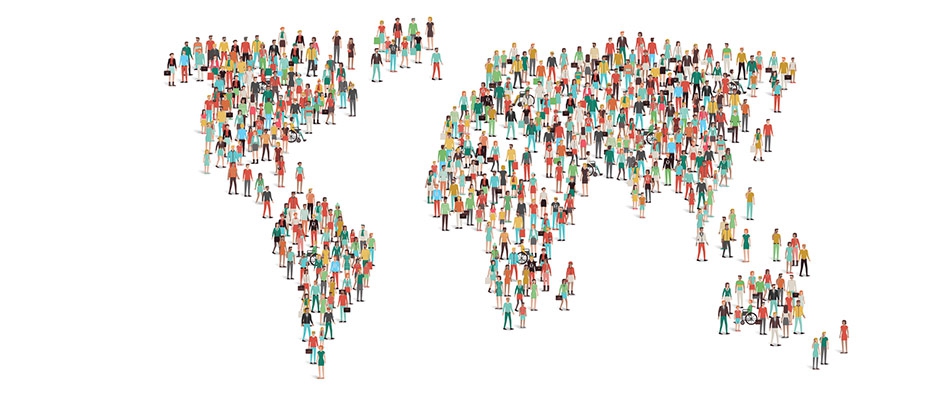The views expressed in our content reflect individual perspectives and do not represent the authoritative views of the Baha'i Faith.
In survey after survey, people all over the world say they believe in world unity and peace—but don’t know how to get there.
That’s such a common response that it’s become a cliché. As a result, when we think about the possibility of peace and unity, some tend to believe in our heart of hearts that it isn’t really possible—that it’s just a hopeless, idealistic dream, without any substantive chance of ever materializing. When people ridicule the concept of globalism, for example, it often comes from the cynical view that we can never achieve the dream of world unity—that human beings simply aren’t capable of it.
But dreams do come true.
In the past, when visionaries and unifiers attempted to gather disparate people, populations and nations together, they were usually ridiculed too. Each major advance in human unity—the city-state, the kingdom, the nation and every international organization—had many detractors, critics who said those advances could never work. When Muhammad attempted to unify the 37 warring tribes of the Arabian Peninsula, for example, he faced enormous obstacles—but within his lifetime, he had established peace and unity in the region.

Winston Churchill
Here’s a more recent example—in the early days when the ideal of European unity was first put forth, people scoffed. Very few serious thinkers could imagine a unified Europe, given its long and bloody history of war, foreign occupation and inter-state conflicts. With so many different languages and cultures in such a small geographic region, many believed, peace and unity were not a remote possibility. Even though recognized writers, philosophers and statesmen like William Penn, Victor Hugo and Winston Churchill had put forth the concept of a “United States of Europe,” most thought it was a pipe dream entertained only by idealists and utopians.
But today, the European Union has brought one common market to half a billion people, and has successfully prevented war in Europe for nearly 75 years.
To overcome the skepticism over humanity’s dreams of unity and peace, we’ve usually needed an example, a model that demonstrably shows the dream can become a reality. In the case of the European Union, the most-cited model historically was the United States, a federalized union of very disparate regions and peoples that had managed, after its own major struggles with genocide, slavery and civil war, to unify and operate as a single peaceful entity.
In the case of global unity, that dream has already begun to come true in the worldwide Baha’i community. If you’re looking for a model of globalism, you can find it among the Baha’is:
Together with the opposing tendency to warfare and self-aggrandizement against which it ceaselessly struggles, the drive towards world unity is one of the dominant, pervasive features of life on the planet…
The experience of the Baha’i community may be seen as an example of this enlarging unity. It is a community of some three to four million people drawn from many nations, cultures, classes and creeds, engaged in a wide range of activities serving the spiritual, social and economic needs of the peoples of many lands. It is a single social organism, representative of the diversity of the human family, conducting its affairs through a system of commonly accepted consultative principles, and cherishing equally all the great outpourings of divine guidance in human history. Its existence is yet another convincing proof of the practicality of its Founder’s vision of a united world, another evidence that humanity can live as one global society, equal to whatever challenges its coming of age may entail. If the Baha’i experience can contribute in whatever measure to reinforcing hope in the unity of the human race, we are happy to offer it as a model for study. – The Universal House of Justice, A Wider Horizon, Selected Letters 1983-1992, pp. 148-149.
When you first encounter the Baha’i community, it may surprise you. Baha’is come from every walk of life, every racial and ethnic and language group, every culture and every former Faith. The world’s second-most widespread religion after Christianity, it covers the globe and thrives everywhere.
So if you’d like to witness, firsthand, a potential model for the dream of global unity, just visit your local Baha’i community. In it, you’ll see a beautiful vision for the future of humanity:
…the Promised One of all the world’s peoples hath now been made manifest. For each and every people, and every religion, await a Promised One, and Baha’u’llah is that One Who is awaited by all; and therefore the Cause of Baha’u’llah will bring about the oneness of mankind, and the tabernacle of unity will be upraised on the heights of the world, and the banners of the universality of all humankind will be unfurled on the peaks of the earth. – Abdu’l-Baha, Selections from the Writings of Abdu’l-Baha, p. 101.
You May Also Like
Comments

















Rothschilds, Soros and their funding banker and politico satanic elites, are not the globalism we want.
I find all these articles very sinister, they are pushing partisan political beliefs whist couched in a Bahai cloak. People are NOT backward who want strong, safe, solvent ...countries not indebited to the IMF or collapsed by Soros, or lied to by Mainstream media and their globalist controllers.